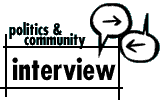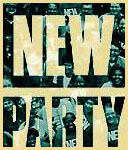

Adam Glickman
interviewed by Anthony Qaiyum on August 9, 1996
Contact the New Party
Web: http://www.newparty.org
Email: [email protected]
Phone: (800) 200-1294
Relevant Resources
The New Party Program
This page contains short summaries of the New Party position on a variety of issues.
New Party FAQ
The New Party answers your questions before you ask them.
New Party Victors
A list of the 87 victorious New Party candidates.
New Party Articles
Links to articles and other interviews with the New Party.

Adam Glickman, 24, is the Communications Director of the New Party. He first became active in politics as an undergraduate at Wesleyan University, where he fought battles for need-blind admissions, workers' rights, affirmative action, and benefits for same-sex partners.
Tripod: Can you give me your impression of the current political landscape and then explain where the New Party fits in?
Adam Glickman: In our analysis, at least 20 years of economic decline for most Americans, combined with 20 years of a failed government response to that economic decline, have left American politics confused, mean, and angry. They have also laid the ground work for mass democratic politics around those issues that have always been key for progressives. That is, how to impose values over the economy other than just profit, and how to build a democracy in a civil society strong enough to enforce those values.
If you look at the polls on any number of issues, vast majorities support what we see certainly as progressive values. You've got a vast majority that support dramatic increases in the minimum wage. You have vast majorities in support of radical campaign finance reform. And vast majorities support huge increases in investment in children and education. There are majorities in support of fair trade as opposed to free trade; in support of imposing some accountability on corporations and limiting corporate welfare.
The problem, of course, is that neither of the two major parties -- certainly not the Republican Party and increasingly not the Democratic Party -- is willing to do the sort of heavy lifting against corporations and corporate power. The mass mobilization of people, particularly low and moderate income people, will be necessary to fight on any of these issues. You see the Democratic Party under Clinton capitulating again and again to corporate and multi-national interests on trade, health care, and labor law. Finally, in an election year, Congress is passing a tiny increase in the minimum wage that still leaves it 30 percent below where it was in 1980, with inflation and all.
Tripod: Also Welfare reform...
AG: Also Welfare. Sixty percent of Americans say regularly in polls that they want a major third party in America -- there's huge interest in Perot and other minor party activity. Our strategy is based recognizing that there are huge obstacles to building a major third party. Particularly if we don't have the money of a Ross Perot or the name recognition of Jesse Jackson. It's a tough road.
Tripod: You can say that most Americans agree with these progressive policies but it seems to me, and tell me if I'm wrong, that someone like Buchanan agrees with many of the things you were just talking about, but you differ on the social issues.
AG: Right.
Tripod: And that also seems to be a stumbling block for the New Party. Many people may agree with the economic and moderate social reforms, but don't agree when it comes to the larger social issues.
AG: It is tricky. Our goal is to build a truly multi-racial working class core organization. We're focusing on those issues which tend to unite rather than divide. Which isn't to say that we're inattentive to the other issues. We do have chapters and groups that work on gay rights, choice, and other social issues.
One thing that separates us from Buchanan is that we're much more sincere in our opposition to corporate power. If you look deeply at Buchanan's economic program, it still contains tax cuts for the rich and is generally anti-union. It's hard for us to imagine a progressive economic program along those lines.
The progressive movement has forever been racked by divisions along race lines, gender lines, and other issues of identity. The challenge for us is to find some way to unite the older progressive concerns -- those centered mostly around class -- with the more recent progressive movements, which are more identity-based -- sexual orientation, gender, race, ethnicity.
